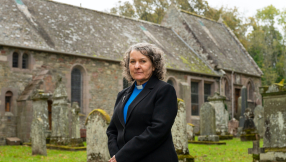The article Is it true that Islam Is inherently violent, published on June 7, tried to walk between the lines of 'Yes, of course it is' and 'No, this is not Islam'. There are factors within Muslim communities and in Islamic theologies (there is more than one stream of Islamic theology) which create a context within which violence can be seen as a viable option. The two issues focused on were the expectation of a right to power, and the assumption of moral superiority, particularly concerning purity and seeing others as unclean. Worryingly, this can feed supremacy and violence.

How then, should Christians respond? Many articles and responding comments from Christians talk about a need to defend ourselves against violence and against an ideology that wants to rule. Many talk about shutting Muslims out, opposing shari'a and not accepting refugees to keep violence out.
We Christians can get defensive. We can get angry at the loss of control, feel challenged and in danger. However, this simply continues the dynamics that feed violence. It mirrors the binary opposition fostered in some Muslim communities of us and them, of the good Muslim and the despised Kuffar (or infidel). It plays up differences and can mean (to misquote the New Testament) that 'perfect fear drives out love'.
This week starts with the sad news of someone driving a van into a group of Muslim men who had just come out of the mosque at prayer time. He killed one and injured others, and was yelling 'Kill all Muslims.' This is one of end results of defensive attitudes.
But there is a better way. There is a way demonstrated by Jesus, our ideal and our model. This is exemplified by a choice. We can choose to eat with our Muslim neighbours.
Jesus' focus was on love of God and love of neighbour. Blessed are the peacemakers, for they shall be called the children of God. In this, Jesus was renowned for eating with people viewed by others as unacceptable, even as enemy. The act of eating together fosters being in relationship, knowing peace, and showing love. If we are acting in a way that would stop us eating together, then this is showing that we are walking in a path that is not the path of Jesus. When we eat together we hear from each other, we hear pain, we hear problems, and we hear hearts. We can also speak what is on our hearts, express pain and express love.
We can refuse to be an enemy. Thirty-six times in the Old Testament we are called to love the stranger. The way of Jesus brought him close to people that were being held at a distance. At a conference on justice I just attended the phrase 'Proximity, incarnationality, and cruciformity' was repeatedly used. We need to be in proximity with those with whom we we want to work for justice. Justice for them and for others. This closeness means a level of relationship and incarnating Jesus' love into a situation.
As Jesus entered our world so we are called to enter the world of our Muslim neighbours. This means an element of cruciformity. It means knowing that we are picking up our cross and following him. Gone is the talk of defending ourselves. Rather we enter the walk of following Jesus to show love, to show justice, and to eat with our neighbours.
So what should we do? We should find our Muslim neighbours and arrange to eat with them. And call them to a better way, the way of following Christ, loving God and loving neighbour.
Dr Colin Edwards is Vice Principal of Redcliffe College and has worked in Muslim contexts in South Asia since 1990.













